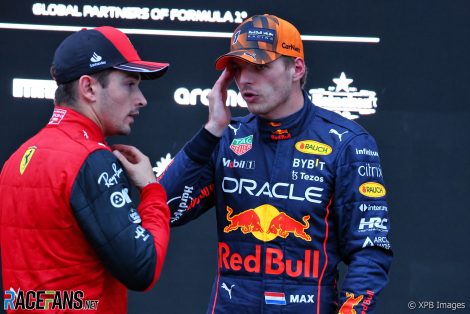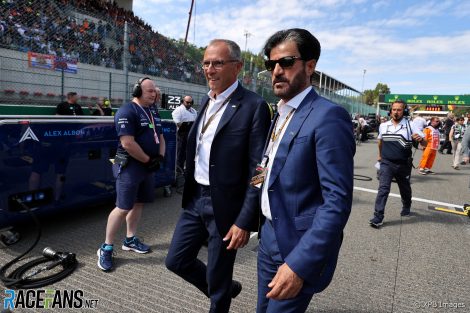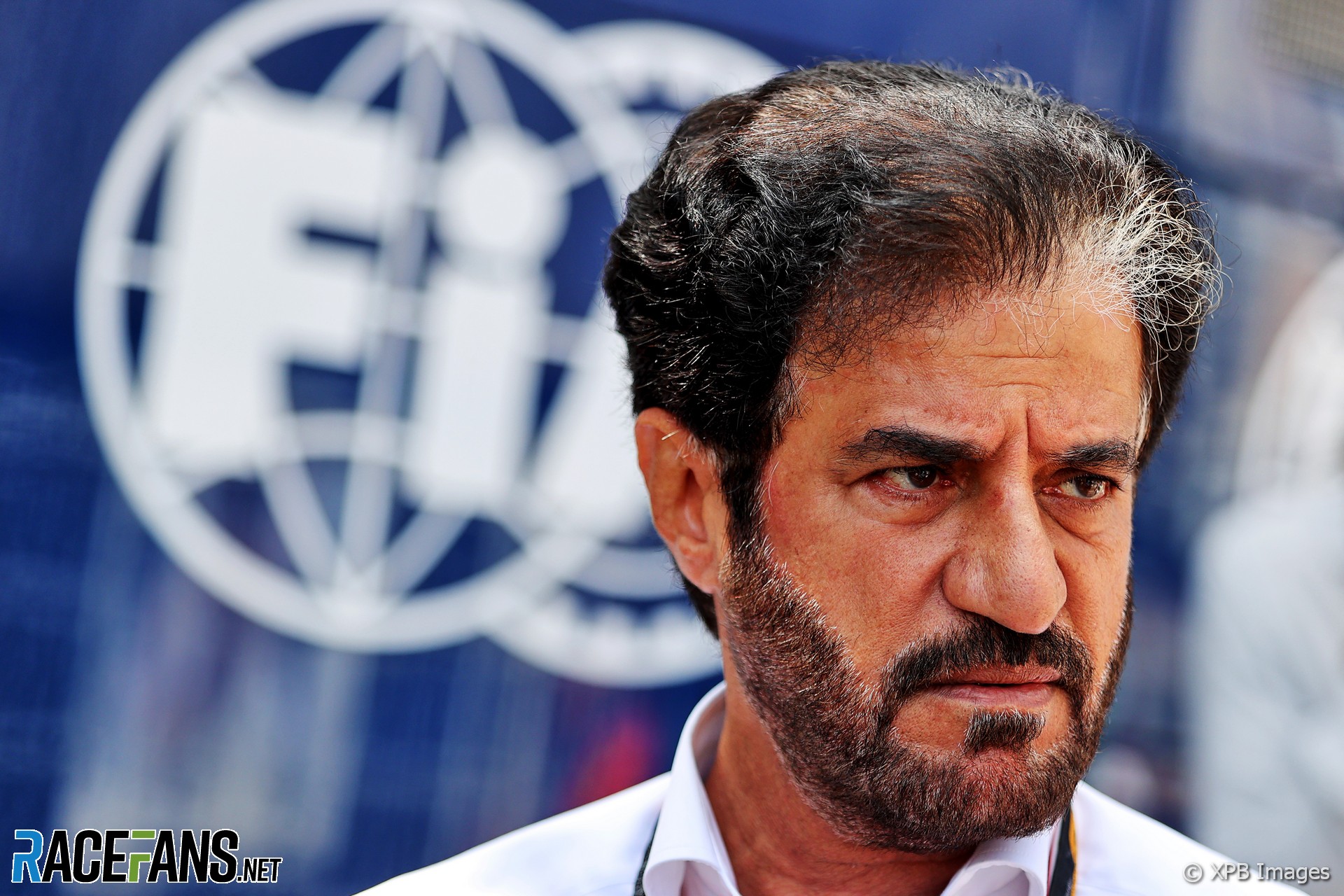Mohammed Ben Sulayem has been president of the FIA for a little over 12 months. During that time Formula 1, undoubtedly the governing body’s most famous series, has kept him busier than he would like.
He was elected to the position five days after the acrimonious conclusion to the 2021 world championship. The FIA’s race director had failed to follow its own rules, leading to a last-lap change of positions which swung the outcome of the title fight, and prompted the governing body to overhaul its race management set-up. The far-reaching changes were finally completed just one week ago.The 2022 F1 season added more pressing issues to Ben Sulayem’s in-tray. These included concerns over the effect porpoising was having on drivers, and subsequent revisions to F1’s newly-introduced technical regulations. There was also crucial negotiations over F1’s overhaul of its power unit rules for 2026. Later in the year came the discovery Red Bull had exceeded F1’s new budget cap as it took Max Verstappen to the 2021 world championship.
All this added up to a distraction from his other priorities as president of a federation responsible for much more than just F1. Ben Sulayem’s background is in rallying, and restoring the World Rally Championship to its former glory is a passion of his.

“I have been dragged – and I’m being very straight and honest – I’ve been sucked into Formula 1. I definitely relied on a very reliable team, which is my team, to come to me with suggestion. But I believe this is the beginning, I am here, so I am going to manage my time between F1, rallying, and do it.
“I have to give more time to rallying because we can fix it.”
But will F1 continue to be an attention-grabbing focus for Ben Sulayem in 2023? The new structure he has put in place to oversee the series is clearly intended to address that. F1 now has a dedicated sporting director tasked with developing race control and drafting the regulations.
Ben Sulayem will expect the kind of errors which occurred during 2022 are not repeated. One of these which clearly irked him greatly, and for which he believes the FIA was unfairly blamed, was the confusion surrounding the outcome of last year’s drivers’ championship at Suzuka.

Indicating how strongly he felt about this, two months after the messy conclusion to the 2022 title fight the FIA president raised the matter on-stage during the FIA’s prizegiving Gala. After handing the constructors championship trophy to Red Bull team principal Christian Horner, Ben Sulayem told him: “Japan, you said, was controversial. No. The FIA was blamed for the points but it was not the FIA which made the rules. It was the teams who made the rules and we were implementing it.”
Those rules are to be rewritten again in advance of the 2023 F1 season, giving an early test of how well the new system is working. But while the situation on-track has been addressed, it seems some of Ben Sulayem’s energies will still be devoted to off-track issues.
Two days after admitting he’d been “dragged” into F1 matters throughout 2022, Ben Sulayem sparked a new confrontation with the series. Reacting to a report that the Saudi Arabian Public Investment Fund had made a $20 billion (£16.16bn) bid for F1, the FIA president questioned whether it was worth that much, describing it as an “alleged inflated price tag”. On Twitter the comments were retweeted by the FIA’s official account, bringing them to the immediate attention of their one million-plus followers.
Advert | Become a RaceFans supporter and
This was always going to alarm F1’s owners Liberty Media due to the concerns over the potential effect of public statements on share prices – a matter which is making big headlines beyond the motorsport world at the moment. F1 issued a strong response to Ben Sulayem’s remarks yesterday.

After F1 CEO Stefano Domenicali said in August the 2023 calendar would not appear for two more months while they awaited the outcome of developments in China, the FIA unexpectedly published the schedule in September. It included a race in Shanghai which, to the surprise of few, was cancelled before the new year had even begun.
But it’s on the issue of expanding the F1 grid to admit a new team such as Andretti-Cadillac that the FIA seems most at odds with the championship. Soon after the new year began Ben Sulayem announced he intended to begin a process for new applicants, which Andretti was first to respond to. F1’s response was much cooler, repeating Domenicali’s earlier insistence that no new team can enter without the championship’s approval.
Whether Ben Sulayem will be able to spend less time on F1 this year and focus his attention on rallying and other subjects may well depend on how eager he is to see grand prix grids expand beyond the meagre 20 cars they’ve been stuck at for years. That is also likely to be the determining factor in whether we see more flashpoints between F1 and the FIA.
Advert | Become a RaceFans supporter and
2023 F1 season
- FIA president cleared of alleged interference in two 2023 races
- First week viewing figures for new Drive to Survive season fall again
- Max who? Drive to Survive season six prefers its favourite faces
- RaceFans’ complete 2023 season review
- The F1 drivers who pulled off the 10 biggest charges through the field in 2023





Alan Dove
25th January 2023, 13:33
Motorsport is F1-centric, and becoming more so. The more others motorsports can detach themselves from the influence of F1 the better in my view. It absorbs everything. Money, resources, time, expertise, interest.
S
25th January 2023, 14:39
I think motorsport is actually becoming less F1-centric than it was – particularly as new audiences grow into motorsports consumption.
Especially from the sporting aspect, but also with the broadcast/distribution of things.
F1’s inaccessibility and high cost is working against it.
Alan Dove
25th January 2023, 14:52
Can’t say I agree. I would say it’s more F1-centric than its ever been. Almost all motorsport media entities now almost fully rely on F1 to drive their engagement. No one else stands a chance. I think those who have the hard data on actual fan engagement know this. View counts on youtube show this.
Also, the cost of watching F1 is a direct result of its overwhelming popularity. It’s a symptom of its success. The less popular something is the greater amount of accessibility we tend to see. Just look at Channel 4 and Formula E. They throw it on their youtube channel because they know it’s not worth putting it on TV. i.e … put more accessible platform because it’s not popular.
Karting is the most accessible motorsport viewing experience in the world. All the major championships are broadcast for free on youtube. The FIA championships you get 3 days of coverage… and i mean ALL DAY coverage. You can watch a ton of national and club events too who stream live (properly done too). i literally watch my local club race meeting for free on youtube via alpha live. but karting doesn’t have anything that can be considered a fan base.
F1 takes everything. Pareto distribution in full force.
S
25th January 2023, 15:37
In your part of the world, maybe – but not mine.
There’s no point counting views. F1 has the largest scale and reach of any series and everyone knows that.
When another series actually tries to compete with F1 in the same way and in the same market space, then there’ll be a comparison.
To some degree, certainly – but not entirely. It is definitely an angle that F1 uses to promote itself to a certain market. They have never been interested in targeting low income earners.
However, if promoters could charge less and still turn a decent profit, most would.
F1’s costs have soared through the roof, the teams are getting a bigger slice of the pie than ever before
That’s not true either. Not in this hemisphere, at least.
Formula E, btw, is increasing in popularity too. It’s not to everyone’s taste, but neither is F1.
F1, here, is quite unimportant. It barely makes TV time at all – at best a snippet on the news, usually only a 15 second slot. If the race was as dull as they commonly are, it gets no mention at all. Same goes for the newspapers – maybe one half column for anything that isn’t the home GP.
Practically nobody buys hardcopy magazines anymore, and most discussion takes place on websites such as this.
Hardly the centre of the motorsporting universe. Other series always get way more coverage than that. Especially top level domestics.
And football – it’s near constant…
Every market is different….
Alan Dove
25th January 2023, 15:46
Who says Formula E is increasing in popularity though? I can’t really reply to your other points because I don’t know what motorsports you’re referring to, nor the region of the world you live.
The point I am making is accessibility is a weird one. With paywalls comes marketing. So it may be more expensive, but the chances you’ll find out about said sport, I propose, increase.
Proesterchen (@proesterchen)
25th January 2023, 16:43
Why? They’d be leaving money on the table. That’d be stupid.
Where applicable, tickets are priced to maximize revenue from a limited number of seats available.
S
26th January 2023, 1:10
The lower the prices, the more they can sell.
Friday and Saturdays tend to not be sold out, and many places don’t for Sundays either.
You ever wondered why there are more events in the Middle East, and less in the places that used to have races – where people actually want F1 to race?
Proesterchen (@proesterchen)
26th January 2023, 9:12
Plenty of races have sold-out crowds, which means their ticket prices are too low already.
You need to distinguish between every seat being filled and tickets having sold out.
No, it’s perfectly obvious.
Who are these people? And why don’t they form a company to contract with Formula 1 for races in their preferred locations?
S
26th January 2023, 11:02
It doesn’t mean that at all.
It means they are selling them all because they are at an acceptable price for enough people (for some of the event – nobody is selling out Fridays).
Raising the price, however, comes at the direct risk of selling less – and perhaps even worse, never having those same customers return in the future.
Do I? You can consider both aspects for yourself, can’t you?
General admission, grandstand seating and hospitality packages are all different things, but still relate directly to overall sales.
Do you only read your own comments here and nobody else’s?
There was an article just a few days ago asking people where they want F1 to go…. It’s a constant source of commentary and discussion in and around F1.
Who will pay for it? Well that’s the point, isn’t it.
F1’s sanctioning fees have outpriced many places that people want F1 to go.
Malaysia lost their GP in large part due to the incompatibility between F1’s asking price and the local economy. A similar thing is happening with Spa right now. Even selling out isn’t bringing in enough cash to offset the costs of attracting and maintaining the event. It’s simply not sustainable.
Proesterchen (@proesterchen)
26th January 2023, 18:02
Yes, it does. As you continue to explain.
Only if you want to make an argument based on attendance. I did not.
If you want Formula 1 to race at a track not currently on the calendar, that’s a you (pay for it) problem.
Proesterchen (@proesterchen)
25th January 2023, 14:03
I contest Mohammed ben Sulayem being the passive party in this claim.
Bullfrog (@bullfrog)
25th January 2023, 14:30
This year he’ll suck in F1.
MichaelN
25th January 2023, 17:02
Part of this has to be because the FIA’s administration did not have a proper Secretary General for Motor Sport. Up to late November 2022 they instead had an interim appointment of the, let’s charitably say, controversial Shaila-Ann Rao.
As far as I know, they haven’t made a new appointment yet. But with the appointment of various sporting and technical directors lower down the organization it seems the FIA is (finally) shaking up its Sporting arm.
SteveP
25th January 2023, 18:03
A number of people who haven’t seen the viewing and attendance figures for 2022 vs. the preceding years?
The stats apparently show a peak a few years ago (when heavily marketed and appearing on free to air week after week) and steadily dropping since.
Whether the drop is a dissatisfaction with the mario-cart gimmicks, dissatisfaction with tracks that make a tour round the Paul Ricard car-park seem interesting, or simply that the peak was people looking for something interesting, gave it a try and then forgot it when it just didn’t stir them enough to get out of bed on time, is unknown.
I read they got rid of fan boost, but seem to have jumped on another gimmick. If I wanted that, I’d play video games.
petebaldwin (@)
25th January 2023, 18:44
“The FIA was blamed for the points but it was not the FIA which made the rules. It was the teams who made the rules and we were implementing it.”
So the teams are now responsible for writing the rules? I always thought that was the FIA’s responsibility. The teams have input, sure, but I never knew it was the teams who actually governed the sport…
I guess he’ll have lots of time for focussing on rally then if F1 is no longer under the FIA’s jurisdiction.
S
26th January 2023, 1:15
The teams and manufacturers have been writing the rules for decades, and they are increasing their input into them every time a new rule is introduced or an existing one is changed.
The FIA’s prime responsibility is the running of the sporting aspect of the events to the current rules. What the rules actually are is very much an FOM thing.